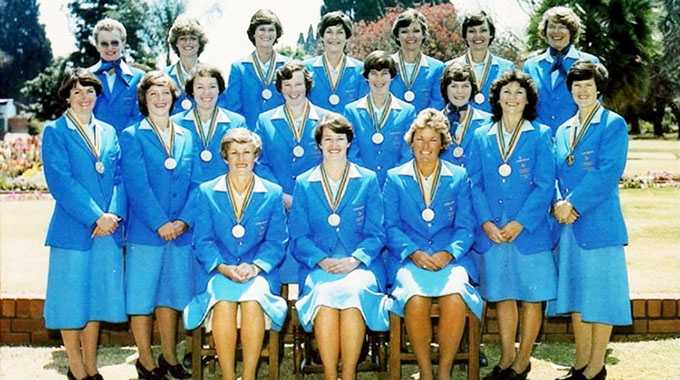Golden Girl Liz Chase dies

Collin Matiza Sports Editor
THE small women’s hockey fraternity of Zimbabwe yesterday woke up to the sad news of the death of the legendary Liz Chase — a member of the “Golden Girls” who made history by winning the country’s first ever gold medal at the Olympic Games during the 1980 Moscow Games in the then Soviet Union.
According to the former president of the Zimbabwe Olympic Committee, Tommy Sithole, Chase died “peacefully” at the age of 68 in South Africa on Thursday.
Field hockey at the 1980 Summer Olympics was represented by two events of men’s and women’s competitions; and it was at those Games that Zimbabwe made their debut appearance at the Olympics as an independent country after attaining its Independence on April 18 of the same year.
At the Moscow Games in July 1980, Zimbabwe was represented by team of 42 athletes (23 men and 19 women) who competed in 10 sporting disciplines including a 16-member women’s field hockey side.
The 16-member squad was assembled less than a month before the Olympics began to help fill the gaps the American-led Olympic boycott created in the women’s field hockey competition.
Zimbabwe’s subsequent victory in the round-robin tournament with three wins and two draws was regarded as a huge upset, particularly considering the team’s lack of preparation and experience; and according to Wikipedia, it has been called an “irresistible fairy story”.
The women’s hockey matches, held between July 25 and 31, 1980, were all played on artificial turf, which none of the Zimbabwean team members had ever seen; they had also never played together until that month.
After beating Poland and the then Soviet Union (now Russia) and drawing with Czechoslovakia (now Czech Republic) and India, the Zimbabweans won the competition on the final day with a resounding 4–1 victory over Austria.
Dubbed the “Golden Girls” by the media in Zimbabwe, they were met by cheering crowds on their return home, and were briefly national celebrities. Zimbabwe did not win another Olympic medal until 2004.
Apart from Chase, the other “Golden Girls” were Arlene Boxall, Sandra Chick, Gillian Cowley, Patricia Davies, Sarah English, Maureen George, Ann Grant (captain), Susan Huggett, Patricia McKillop, Brenda Phillips, Christine Prinsloo, Sonia Robertson, Anthea Stewart (player-coach), Helen Volk and Linda Watson.
And the Hockey Association of Zimbabwe yesterday paid tribute to one of the history-making “Golden Girls” — Liz Chase — following her untimely death in South Africa on Thursday.
“It is with great sadness that we announce the passing of Liz Chase on 9th May in Johannesburg after a long illness,” the HAZ wrote on their Facebook wall yesterday.
“Liz was born in Mutare, with her high school years being spent at Girls High School in Harare. Her hockey talent was seen early on and she has had an illustrious and distinguished playing career. From the National Schools team in 1966 to National Under-21 and to the senior side there was little that Liz had not accomplished.
“From school she went to South Africa to get her degree in Physical Education. During this time she played for the varsity and the local provincial sides of Wits and Southern Transvaal, excelling in the depth of competition.
“In the seasons 1973/74 Liz was chosen to represent South Africa B and then in 1976/77 she was chosen to represent the Springbok Ladies Hockey team.”
On her return to Zimbabwe she played for Old Hararians club while teaching Physical Education and coaching sports teams at Oriel Girls High School in Harare. She was selected for the national side every year until she immigrated to South Africa in the early 1980s.
She was one of the cornerstones of the gold medal-winning Zimbabwe team at the Moscow Olympic Games in 1980, being selected as vice-captain for this too, according to HAZ.
“Liz was a strong and hard-hitting striker with a turn of speed, good ball control and great vision.
“Her skill on the field was matched by her coaching skills off it and this she took with her to South Africa. She was in charge of the physical education department at Wits (University) for a number of years till her retirement in 2015.
“She was great fun to be with, a larger than life character, an integral part of the team. For us her teammates she was more than just a player. In the years since our hockey days, the bonds of love and friendship have only strengthened and we will miss her beyond words. To the family, friends and colleagues our deepest sympathy on the loss of Liz,” the HAZ wrote on the Facebook wall.











Comments